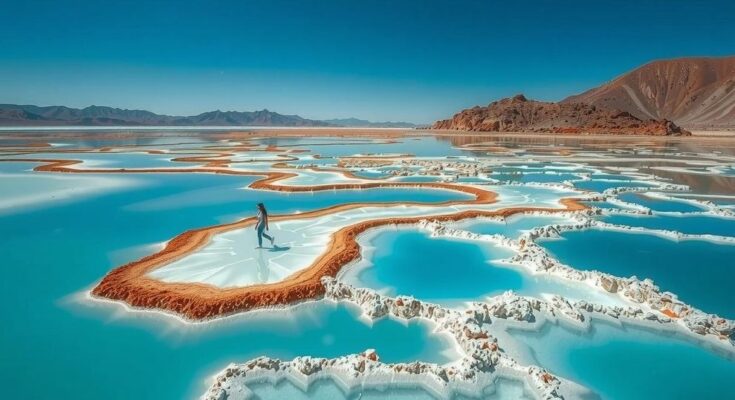At the Ascotan salt flat in Chile, the unique fish species Orestias ascotanensis faces threats from upcoming lithium mining projects. Despite its remarkable adaptations to extreme environmental conditions, local residents are concerned about the impact of mining on the fish population, which has already suffered due to water extraction from copper mining. Environmental experts emphasize the necessity of safeguarding this fragile ecosystem amidst economic interests.
Chile’s Ascotan salt flat, situated at an altitude of over 3,700 meters (12,000 feet), is home to the unique fish species known as Orestias ascotanensis, commonly referred to as “karachi.” This small ray-finned fish, which reaches a maximum length of 7.5 centimeters (3 inches), has adapted remarkably to the extreme environmental conditions of its habitat, which include high levels of heavy metals, significant salinity variations, and substantial temperature fluctuations. However, local residents express concern that a proposed lithium mining project could threaten the fragile ecosystem that supports this species, especially as water extraction from copper mining has reportedly already diminished its population. Scientists from the Millennium Institute’s genome center have undertaken studies of this resilient fish, identifying genes that enable it to withstand the salt flat’s harsh realities, which involve solar radiation exposure, toxic heavy metals, and low oxygen levels. These adaptations have evolved rapidly, as noted by Miguel Allende, the institute’s director, who stated, “We’ve seen how they’ve done this in a short evolutionary time because there are other variants of this fish in less hostile environments. They’ve taken these genes and exacerbated them.” Despite the fish’s impressive adaptations, maintaining a suitable habitat remains crucial. Local resident Mauricio Anza emphasized the impact of water extraction on the fish population, stating, “That’s what’s hurting them; when they take the water, the fish die.” Anza and other inhabitants are actively striving to safeguard their local environment. Fueled by economic interests, the Chilean government is considering private lithium mining within the salt flats, prompting calls from both residents and environmental experts for robust environmental protections. Miguel Allende reiterated the necessity of prioritizing ecological integrity, arguing, “Mining activity, while important from an economic point of view, must be carried out with the aim of ensuring that this very particular environment is not lost forever.”
The Ascotan salt flat in Chile represents a delicate ecosystem that harbors unique species such as the Orestias ascotanensis, a fish capable of thriving in extreme saline and metallic conditions. This upper-altitude habitat, characterized by high UV radiation and fluctuating temperatures, is now facing the challenge of lithium mining, which poses a potential risk to its biodiversity. Recent studies have shed light on the fish’s genetic adaptations, yet ongoing mining activities, particularly for copper, have already strained its population, prompting concerns from local communities about further ecological degradation.
In conclusion, the plight of the Ascotan salt flat’s endemic fish species underscores the critical balance between economic development and environmental conservation. The Orestias ascotanensis demonstrates remarkable adaptations to its harsh habitat, yet this resilience may be insufficient if mining projects proceed without stringent ecological safeguards. Maintaining the integrity of this unique ecosystem is essential for the survival of its native species, as well as for the local communities that depend on it.
Original Source: www.straitstimes.com




